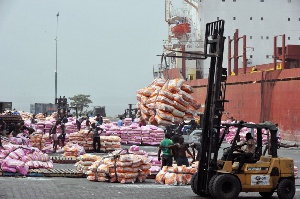The Minority New Patriotic Party (NPP) in Parliament has warned that the mass importation of food items in large quantities poses a serious threat on the livelihood of Ghanaian farmers and fisher folks.
That aside, it also has a serious repercussion on the balance of payment of the economy, noting that if measures are not taken to curtail the situation, local food production in the West African country will soon diminish.
“Given the importance of these food items in the domestic agricultural economy and in the economy in general, the mass import of these food items in such large quantities poses a serious threat not only on the livelihood of our farmers and fishers but also to the balance of payment of the economy. These imports are obviously competing directly with local production under trade conditions which are putting our local farmers, fishers and overall food security at risk,” Spokesperson for the Minority on Food and Agriculture, Dr. Owusu Afriyie Akoto told journalists at a press conference in Accra on Tuesday.
The event was in response to the governing National Democratic Congress (NDC) 2016 Manifesto as it relates to the agricultural sector of the Ghanaian economy.
According to the Minority, data provided by the Ghana Statistical Service (GSS) indicates that between 2007 and 2015, the total value of imports of eight major food items namely rice, sugar, poultry, fish, wheat, vegetable oil, salt and vegetables together sky-rocketed by nearly seven-fold, thus from US$344million in 2007 to US$2.3billion in 2014 and to over US$2.1billion in 2015.
During the same period, the total volume of imports of the eight food items escalated from 882,000 metric tons in 2007 to a peak of 1,343,000 metric tons with slight dips in 2014 and 2015.
“The 2015 import bill of US$2.1billion for the eight food items is equivalent to the total foreign exchange earnings from our major export cocoa in 2014/2015. Looking at it from another perspective, it is more than the US$2billion cocoa syndicated loans borrowed annually from foreign banks for the purchase of cocoa in crop year 2015/2016 and for the coming 2016/2017 cocoa crop,” noted Dr. Owusu Afriyie who is also the MP for Kwadaso in the Ashanti Region.
He added “an examination of the individual items reveals even more disturbing trends. For example, the value of rice imports has escalated eight-fold from US$152million in 2007 to a peak of US$1.2billion in both 2014 and 2015. In the same period, the volume of rice imports climbed from 44,000 metric tons to 630,000 metric tons. The value of imports of sugar rose more than five times – from US$109million in 2007 to US$564million in 2014. In the case of poultry, the value of imports rose nearly seven-fold- from US$57million in 2007 to US$374million in 2015.”
Dr. Owusu Afriyie further explained that the huge volumes of food imports clearly relate to the declining growth performance of local food production in the past eight years under the governing National Democratic Congress (NDC).
Public investments in the agricultural sector, he added, have declined while budgetary and petroleum revenue disbursements to the sector have been cut drastically.
“Budgetary allocation to agriculture has been cut from 3.4% in 2008 to 1.1% in 2014 and 2015. In spite of the loud and constant rhetoric by government officials of the importance of agriculture to this economy, the reality on the ground tells a different story. Farmers and fisher folks are increasingly impoverished and you only have to visit the rural areas and the fishing communities to confirm this assertion”.
General News of Wednesday, 5 October 2016
Source: kasapafmonline.com













